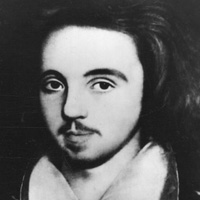Christopher Marlowe - Biography and Works
As the most striking personality and the most impressive dramatist among the University Wits, Christopher Marlower wrote Tamburlaine the Great with the main theme of the lust for power. He deserves mention in the Elizabethan Age due to his rebel against established order, and challenge to the divine rule. He had 'earthly sort of belief instead of Godly sort of belief.

Christopher Marlowe (1564-1593)
In the very book, he embraces the excitement of new geographical discoveries, oriental splendour, all the new glory of Elizabethan poetic utterance, the Renaissance feeling for virtue, lyrical enthusiasm and so on. As geography, history, and romance came together in the Elizabethan and seventeenth century poetic mind with powerful effect, Marlower did not remain untouched. The intoxication with power is perhaps the main theme of Tamburlaine. Tamburlaine has the Faustian urge, the urge to reach beyond the limits of mortality. His conquests have no material objective in view: they are metaphysical in inspiration. Doctor Faustus is a Tamburlaine on the intellectual level; his ambition is for ultimate knowledge.
His Doctor Faustus is full of the spirit of Renaissance ambition and virtue, but there is also a specifically Christian background. The devil is effectively set against the Renaissance zeal for limitless understanding, the popular Christian notion of a forbidden knowledge, all the dark ideas of witchcraft and black magic, which had haunted the mind of Europe for centuries.
All the heroes of Marlowe are lonely souls who have no real confident as Tamburlaine and Faustus.
In this way, Marlowe alone remained almost equal to Shakespeare in drama. The modification in the concept of tragedy made him remarkable. For him, the subject of tragedy is the matter of individual hero rather than King and Queen. The characters are common people in his works. Tamburlaine is a shepherd and Dr. Faustus is a poor scholar but the works remained influential in his age. These tragic heroes are full of life and vitality not the puppets. They are vigorous and strong enough.
Marlowe was the first English playwright to perceive that tragic action must issue from, and be reflected in, character. Marlowe's characterization is simple; nevertheless his heroes are individuals; they all arouse sympathy in some degree, Faustus and Edward II in high degrees; and in their own natures are the seeds of their fates. This was Marlowe's greatest contribution to English tragedy greater even than his revivification of its diction and meter. Marlowe imparted passion, vehemence and force to drama. He set the stage on fire with the flame of his passion. Marlowe added poetic grandeur and poetic excellence to drama. He breathed into drama the life-spirit of poetry. He was the morning star of Elizabethan drama, and when he perished suddenly in the prime of his youth, men felt that Lucifer had fallen from heaven".
Marlowe made improvement in the field of Tragedy and modified the conception of tragedy held in the Middle Ages. For the Middle Ages, tragedy was a thing of princes; for Marlowe it was a matter of individual heroes. In a typical Marlowian tragedy a giant figure is portrayed, and his consuming passion reaches beyond the ordinary aspiration until he meets his fate. The interest lies not in the mere fall, but in the struggle between the overweening soul, typically of the Renaissance, in its insatiable ambition, and the limitations which it seeks to overcome. Further, Marlowe added the element of struggle which was absent in the tragedy of the Middle Ages. In the old conception, tragedy depicted the fall of the hero under the domination of fate. It was Marlowe who introduced the element of struggle. In Dr. Faustus, there is a constant struggle within the soul of Faustus himself, represented by the good and bad angels.
The medieval conception of tragedy was a distinctly moral one. Drama had to show this falling into adversity and thereby inculcate a didactic lesson. There is no moral of this sort in Marlowe's tragedy. In all these ways Marlowe revolutionized the old conception of tragedy and made it fit for the need and new urges of the Renaissance.
Marlowe was the representative dramatist of the Renaissance period. In his four plays, Tamburlaine, Dr. Faustus, The Jew of Malta and Edward II, we have a fair expression of the entire age with all its new aspirations, hopes and dashing adventure. Marlowe is the dramatist of the Renaissance which people felt and lived. Marlowe touches almost all aspects of the Renaissance in his works.
